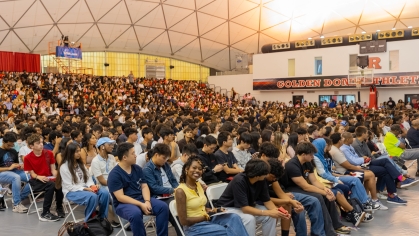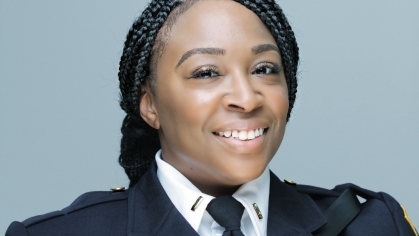Intercultural Resource Center Provides Space for Students to Explore a Range of Identities and Affiliations

The Intercultural Resource Center at Rutgers-Newark is a place where nearly every group has a home, including LGBTQ students, undocumented students and those from a range of cultural backgrounds. Students with various political and religious affiliations can also form connections there.
The center hosts events, provides meeting spaces, encourages student-led dialogue, offers guidance, and organizes cultural heritage month celebrations. In the spring, it holds affinity graduation ceremonies for queer students, Black students, Latino students and those who are undocumented.
“No matter your identity or political affiliation, My team and I want to provide the best experience for you so you can be successful,’’ says the center’s director Gary Santos Mendoza. “What makes it unique is that we’re doing work in relation to all identities on campus and how they can coincide.’'
He added, “Creating spaces of celebration and affirmation is also a big thing.”
Located in Blumenthal Hall, the center, which is part of the Division of Student Affairs, serves nearly 3,000 students annually.
Santos Mendoza describes it as a place where students can explore their identities and learn more about classmates at Rutgers-Newark, one of the most diverse campuses in the nation. One role of center staff is to serve as advisors to the many cultural, identity and religious-based student groups at Rutgers-Newark.
“I want people to know that we’re the student diversity center on campus. We help out in relationship to DEI efforts and support student organizations. We also offer training, like bias training,’’ he said. “A lot of it is peer-to-peer. Students don’t always want to talk to a staff member. They want to talk to each other.’’
Among the groups involved with the center is RU Pride for LBGTQ students. Other groups include the Muslim Student Association, the Indian Student Association, the Filipino Student Association, Rutgers Immigrant Student Empowerment (RISE), Dominican Talks, Rutgers Students for Justice in Palestine, the Peruvian American Cultural Association and Trans Student Union.
A mission of the center is to foster dialogue among students, who often choose which issues to explore. DEI of Dialogue takes place during the month of October, when day-long conversations are held on specific issues or current events and led by cultural and identity-based student organization leaders.
“We ask ourselves, how do we present the issues and ideas on campus in a way that’s well informed?” said Santos Mendoza.
He anticipates an increased amount of activity during the election and post-election season, when the center supports student activism and helps prepare students to engage as citizens, including efforts to raise awareness of laws and policies that might affect them, such as abortion restriction, immigration laws, and laws that impact trans people.
“We’re creating a space where students can connect and discuss the election and process after the results are in,’’ he said.

